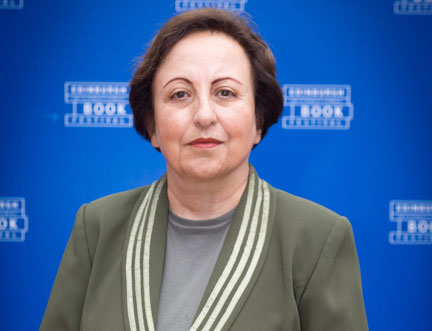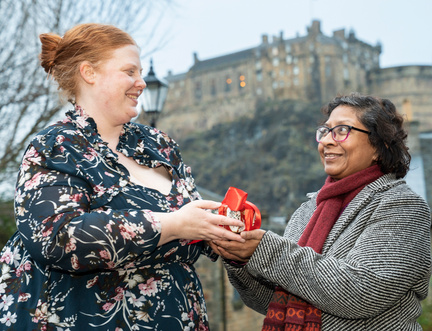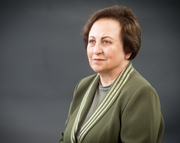More articles Sunday 14 August 2016 1:30pm
Nobel Peace Prize Winner Shirin Ebadi Speaks Out

A winner of the Nobel Peace Prize launched a blistering attack on the government of her native Iran in an incendiary session at the Book Festival last night. The regime, says the celebrated lawyer and activist Shirin Ebadi, has reacted to her criticism of its human rights record by depriving her of her livelihood and possessions; listing her as a target for assassination; and harassing and entrapping members of her family to induce them to denounce her, using tactics that she says make a mockery of its claims of fidelity to Islam.
“I am followed by the threat of death,” said Shirin Ebadi. “Their aim is to silence me.”
Born in Hamadan in 1947, Ebadi was the first female president of Tehran’s city court and Iran’s first female judge. Her legal career was curtailed when, in the aftermath of the 1979 Iranian revolution, conservative clerics restricted the right of women to work as judges. She has since authored numerous books on Iranian society, politics and religion, and practiced as a lawyer, with a particular interest in defending scholars, activists and members of minority groups.
The issue, Ebadi asserted, is not one of religion, but of power. “People who all believe in one God – why are they fighting each other?” she said. “Because of political power.” Religion, she strongly argued, should have no place in lawmaking. “The first prerogative for a democracy is secularism. We can be Muslims in our own private homes.” The imposition of Sharia law and brutal punishments for its infringement are not, says Ebadi, representative of the true spirit of her religion, but a matter of selective interpretation, aimed at conserving a particular power balance. “The name of Islam is being abused – by terrorists, as well as by non-democratic countries such as Iran and Saudi Arabia. Islam has the potential to adapt itself to human rights principles – what is important is who is interpreting Islam.”
Ebadi became the first Iranian winner of the Nobel Peace Prize in 2003, in recognition of her work for human rights - particularly her advocacy on behalf of women and children. “It gave me more platforms and loudspeakers through which I could make sure my voice was heard throughout the world,” she said. “Of course it did not help my situation inside my country.”
A composed, forceful presence, Ebadi also displayed her undimmed sense of humour when speaking of her ordeals. She recalled how the Iranian president at the time, Mohammad Khatami, denigrated her win, claiming that the Peace Prize was of less significance than its literary counterpart. “Which is why I am determined to win the Nobel Prize for Literature…!”
There was little humour to be found, however, in her gruelling account of how her husband, Javad Tavassolian, was tricked into denouncing her on state television. According to Ebadi, Tavassolian was caught in a “honey trap” by the Iranian government, which sent a woman to seduce him, filmed the resulting encounter, and then threatened him with the death penalty unless he spoke against his wife. “The Iranian government claims everything it does is Islamic,” she said. “That all women must wear the hijab. This very government recruits sex workers in order to get the desired outcome.”
Her own openness about her experience was, she said, intended to set an example to others to speak out about their treatment. “I used to say to my clients: you have to expose these things, talk about them publicly. Which is why I wanted to break that taboo – to expose what the government does.” A change, she said, is necessary for the salvation of the country she loves. “The Iranian government must change its domestic, regional and international policies – otherwise it should expect a very dire future.” The responsibility, in her opinion, is an international one: “Governments that respect human rights must take steps so that governments that have no respect for human rights are forced to respect them.” She made specific criticism of the UK for permitting the broadcast of the Iranian state-owned English language television channel, Press TV, which broadcasts forced confessions such as that coerced from her husband.
Ebadi’s impassioned, powerful mix of personal testimony and political critique ended on a delightfully unambiguous note, when chair Faith Liddell asked her guest if she considered herself to be brave. With no false modesty, but a roguish grin, Ebadi confirmed the audience’s unavoidable impression: “Yes. I’m very brave.”
Look, Listen & Read
- 2025 Festival:
- 9-24 August
Latest News
 Communities Programme participants celebrate success of 2024
Communities Programme participants celebrate success of 2024




